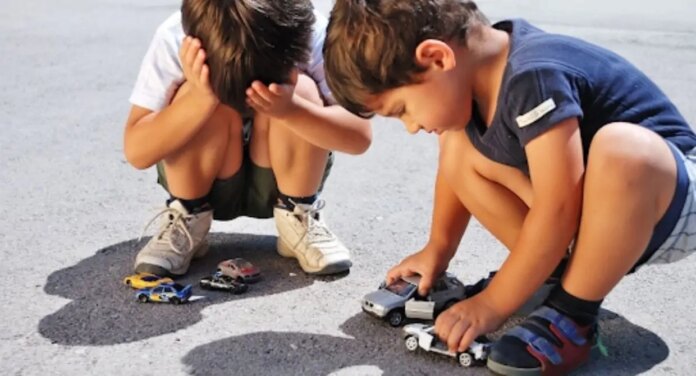Sharing is caring.
It’s a phrase you’ll have heard your kids say after preschool or a play date. Maybe you’ve mentioned it your self.
Every mum or dad is aware of that kids have strong inclinations towards possession. They are born curious and love the idea of exploring and accumulating extra.
So naturally, toys are engaging–particularly those in one other child’s arms!
That’s why parents dictate sharing so early and so usually. We need kids to follow compassion and think about what different youngsters would possibly need or want. We ask them to share their toys and appease different youngsters within the spirit of kindness and good manners (and to keep the playground peace).
(Check out our FREE List of Encouraging Words to encourage your kids’ confidence and good intentions!)
And usually, kids start demanding different youngsters’s toys as in the event that they personal them. They shrewdly hoard objects like pirates stockpiling gold. They even count on you to share the ice cream you’ve waited all day to get pleasure from.
Sharing is caring, you think about, whereas rigorously guarding your dessert. Just not when it isn’t genuine.
There’s an enormous distinction between making kids share and encouraging kids to share. And in accordance to creator Heather Shumaker, that distinction is crucial.
Based on her guide It’s OK NOT to share…and Other Renegade Rules for Raising Competent and Compassionate Kids, Shumaker makes the case that sharing needs to be real. It shouldn’t be accomplished begrudgingly or on-demand. It wants to be self-inspired. And its rewards play out long-term–not simply within the heat-of-the-playground second.
Want the complete (ice cream) scoop? Here are 3 progressive methods to encourage lifelong generosity in your kids by saying, “It’s okay NOT to share.”
1. Forget Forced Sharing
Envision your son on the playground, enjoying together with his toys. Another boy eyes his purple, shiny Hot Wheels automobile. He follows your son round, demanding, begging, and pleading to play with it.
Many parents observing this scene would possibly say, “It’s time to share the car. You’ve had a chance to play with it, but that little boy would really like to play with it for a few minutes, too.”
Sharing is about giving. It’s about kindness. The drawback is, it’s usually wrapped within the thought kids have to oblige somebody at a second’s discover.
Your son was busy enjoying, both misplaced in an imaginary world or simply minding his personal enterprise, and is immediately requested to cease as a result of another person desires the identical toy. Why?
According to Shumaker, this baby doesn’t study to be beneficiant. He simply “learns that sharing feels bad.”
Plus, “in reality,” Shumaker states, “it’s the parents who are sharing, not the kids.”
Even extra ironic is that adults aren’t anticipated to do that.
Shumaker paints the proper instance: “Imagine being busily engaged with your smartphone. Suddenly, someone insists you hand it over, maybe even taking it from you. ‘I need to text a friend,’ he says.”
Sure, it could possibly be an emergency. But wouldn’t your quick response be anger, suspicion, and fewer need to assist?
Forced sharing builds resentment. It makes sharing annoying. It doesn’t train generosity; it stifles it.
As Shumaker summarizes, “We might gladly lend our phone to a friend or even a stranger, but we want them to wait until we’re done. The same should apply to kids.”
Don’t Worry About Placating an Impatient Child
Children could make an enormous scene. Toddlers have tantrums over the only of toys. Entitled kids demand what they need precisely when they need it.
It’s intimidating, and it could actually flip even the sunniest, grassiest playground right into a made-for-TV drama.
But don’t give in. An impatient baby wants to study to wait.
Shumaker explains: “Learning to control behavior and express intense feelings appropriately is one of the main jobs of early childhood. Impulse control (waiting for a toy and not grabbing) is vital to brain development and gets stronger through practice.”
Turn-taking gives these alternatives.
Most kids are already overloaded with toys. Many are accustomed, extra so than earlier generations, to prompt gratification. If something, they require extra follow in ready patiently.
Making them wait is definitely worth the scene and the frustration. The extra alternatives they’ve to follow, the simpler that wait turns into.
The secret is to keep away from pressured sharing however to achieve this in a courteous, non-confrontational manner. Because it’s usually an concept that different parents, kids, and lecturers are unfamiliar with.
Read on for precisely how to do this!
2. Emphasize Child-Directed Turn-Taking
Imagine the identical preschool or playground battle with the coveted automobile. Instead of stating, “You have two more minutes to play with the car before I’ll ask you to share it,” encourage your baby to say:
“You are welcome to play with it when I’m finished.”
Shumaker cash this child-directed turn-taking. Its emphasis “teaches positive, yet polite, assertiveness.”
We can encourage kids, by means of child-directed turn-taking, to respect themselves and set up limits.
As Shumaker reminds us, how many people as adults have hassle saying “no” to issues we don’t need to do or commit to?
Instead, we will enhance truthful therapy and satisfaction by permitting youngsters to make their personal sharing selections.

Still, to assist a toddler desperately wanting a flip, you may train her to ask courteously, “Can I please have a turn with that when you’re done?”
The “when you’re done” a part of this phrase is essential–it reminds everybody that turns final till the turn-taker is completed (however that everybody will finally get the identical alternative).
Shumaker suggests we additional iron out the turn-taking course of with the next phrases:
For the Turn-Taking Child
– You can play with it till you’re all accomplished.
– Are you completed together with your flip? If not, then you may say so!
– Did you prefer it when he grabbed your truck? You can inform him to please cease.
– Say: “I’m not done. You can have it when I’m done.”
For the Waiting Child
– Oh, it’s so onerous to wait!
– You will be mad, however I can’t allow you to take the toy.
– You’ll have to wait. I can’t allow you to take it out of her arms.
– I see Ella nonetheless has the horse. She’s nonetheless utilizing it.
– It’s Ella’s flip proper now. When she’s accomplished, then you may have a flip.*
*Pro Tip: Have you tried the When/Then device? It applies to limitless parenting conditions, together with ready and sharing! Check out our article, 4 Things to Say Instead of “Because I Said So” for the 411. Or, should you’re already a Positive Parenting Solutions Member, assessment Step 3: Lesson 23 of the 7-Step Parenting Success System for a fast refresher!
Additionally, Shumaker suggests making a Waiting List. Head to the park with a pocket book or clip board for all of the kids to see. When they end their turns, they’ll cross their names off the listing.
Visual reminders like these are as useful for kids as they’re for adults (we’re at all times relieved to know when our quantity is subsequent in line on the DMV or our title is subsequent up for a dinner desk.)
Even Long Turns Are Okay
Here’s the chilly, onerous reality: If your baby determines the size of his flip, it is perhaps a number of seconds or a few hours.
No one else will get a flip, you would possibly fear. Won’t that be impolite?
Absolutely not! Long turns are utterly affordable. Continued, targeted play permits kids to hone their pursuits, follow abilities, and work on focus. It indicators a fantastic consideration span, slightly than forcing kids each jiffy to assume, “Okay, what’s next?”
Kids additionally take longer turns after they anticipate pressured sharing. They maintain on to toys simply to keep in management. Or, they might be testing your earlier promise if you mentioned, “let’s go to the park–you can play with your toys all afternoon!”
If your baby hoards toys ‘just because,’ she seemingly doesn’t belief you’ll comply with by means of.
It could also be onerous at first, however when one other baby hovers over a toy she clearly desires, calmly let that baby know she’ll have to wait till your kiddo is completed enjoying.
Sure, the anxious baby will seemingly complain, pout, or scowl. You could really feel her close by parents, watching and listening to your each phrase. But belief your pleasant tone and matter-of-fact assertion:
“My daughter will be happy to share with you when she’s done! I don’t know when that will be, but she can let you know if you’re still here.”
Even higher? Encourage your daughter to say so herself!
Even in case your baby has to take a break for a nap or a meal, she nonetheless will get it again afterward — till she decides she’s completed!
As Heather Shumaker states, “Time doesn’t matter to kids. But fairness and consistency mean everything.”
Gradually, lengthy turns could grow to be exponentially shorter. Even if not, it’s okay.
Sharing Communal Items in Crowded, Public Spaces
Some situations require fast-paced sharing as a typical courtesy.
Your child can’t preserve a whole bouncy home to himself on the neighborhood picnic. Nor can he get his face painted 3 times in a row on the truthful whereas different kids are ready.
These are situational nuances that, with our assist, kids study over time. But to clarify why sharing modifications based mostly on circumstance, listed below are a few of Shumaker’s pattern phrases:
– The climber is designed for everybody.
– There are many kids right here. Today, we want to take quick turns to be thoughtful in direction of others.
– At residence, you may take a protracted flip. At the museum, it’s completely different.
– Your flip’s over. If you need to do it once more, you want to line up and wait for one more flip.
3. Encourage Willful Sharing
We can nonetheless sow the seeds of goodwill whereas refusing to make youngsters share.
When a toddler drops a toy and strikes on, remind her that different kids are ready for a flip. Maybe she will discover a ready baby and produce the toy to her. It’s a fantastic lesson in courtesy and consciousness of others.
You may also encourage a ready baby to kindly inform the opposite baby how he feels. Kids who take lengthy turns can study, with out guilt, that their actions affect others.
Phrases That Encourage (But Don’t Force) Sharing
While real sharing wants to be a toddler’s selection, parents can nonetheless direct kids in direction of this mind set. Shumaker suggests saying:
– Will you inform Max if you’re all accomplished?
– I see you’re not utilizing the truck anymore. Go discover Ben. Remember, he’s ready for a flip.
– Zoe doesn’t have to give it to you, however you may inform her how you’re feeling.
– You can inform her you’ve been ready all morning, and it makes you mad.
Soon sufficient, remembering to share will come naturally. And the second a toddler willingly arms over a toy can be all of the extra euphoric and genuine for each kids.
This is when one baby experiences the satisfaction of being variety to others. It’s when the opposite baby realizes {that a} gifted flip, slightly than a stolen one, is definitely worth the wait. Both are priceless, completely satisfied emotions that kids will readily replicate.
The earlier kids study generosity by means of willful sharing, the extra it turns into a part of their everlasting character. They will have a tendency in direction of compassion and gratitude for the remainder of their lives. And the earlier kids are required to follow endurance, the extra they’ll face up to future setbacks.
Final Thoughts
It will be onerous to stray from the established order, and sharing generally is a controversial topic. But if ‘normal sharing rules’ aren’t feeling fairly proper, don’t hesitate to discover a new motto.
“To share is to care: when you’re ready and when it feels fair.”
What You Should Do Next:
1. Subscribe to my Newsletter:
Sign up for my publication for parenting suggestions to provide help to create a happier residence and grow to be the mum or dad you at all times needed to be. Plus, if you subscribe, I’ll additionally ship you a duplicate of our strategy-packed information 10 Tips for Better Behavior – Starting NOW!
2. Register for my FREE 60-Minute Class:
Register for my free class referred to as How to Get Kids to Listen, Without Nagging, Yelling or Losing Control. Classes run a number of instances per week however I like to recommend you register early, as areas are restricted.
3. Enroll in my 7-Step Parenting Success System
Enroll now in my confirmed 7-step system for busy parents prepared for change (it is rated 5 stars on Google). Plus, for a restricted time, save 10% plus get a FREE improve on all plans—utterly risk-free and with lifetime entry.
About the Author




